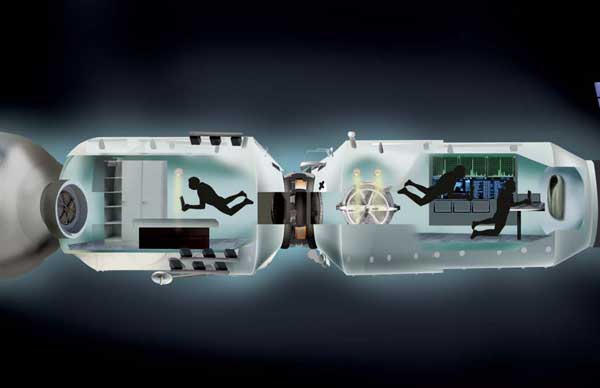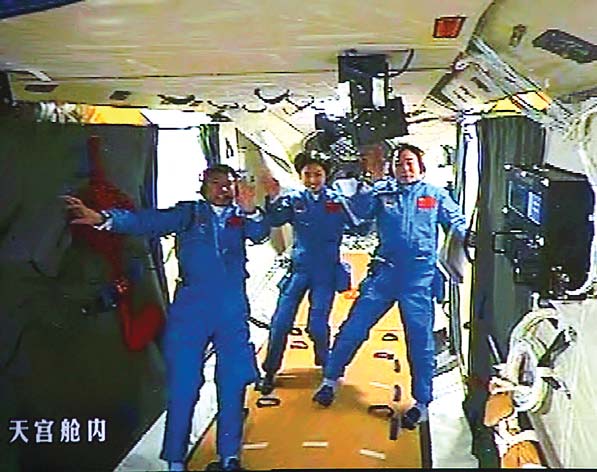China successfully completes space docking
Updated: 2012-06-19 01:27
By Xin Dingding (China Daily)
|
||||||||

Successful docking signals milestone in country's space mission
The orbiting Tiangong-1 space lab module received its first tenants on Monday, after a successful docking with the manned Shenzhou IX spacecraft.
The docking, by automated procedure, was completed at 2:14 pm.
Three astronauts, including China's first female astronaut Liu Yang, waited inside the Shenzhou IX spacecraft's re-entry capsule while the pressures inside the vessels were equalized. Once it was confirmed that it was safe to open the hatches, mission commander Jing Haipeng entered Tiangong-1 at 5:07 pm.
Grabbing handles on one side of the capsule which was colored khaki to signal "ground", he quickly made his way into the space lab module.
Upon entry, he adjusted to the weightlessness and waved to a monitoring camera.
The slightly awkward maneuver drew sympathetic laughter from the scientists and engineers watching at the Beijing Aerospace Control Center.
Yang Liwei, China's first astronaut and now deputy director of the manned space engineering office, said that astronauts usually need some time to learn how to control their body posture in a zero-gravity environment.
Tiangong-1 is also much larger than the Shenzhou IX spacecraft and requires some getting used to.
|
 A video screen grab shows astronauts in the Tiangong-1 space lab module on Monday. [Photo by Xinhua] |
"I envy them being able to experience weightlessness in such a spacious module," he said.
Following Jing, astronauts Liu Wang and Liu Yang joined him in Tiangong-1. "We have entered the target module. Feeling good," Jing reported.
The three, still not familiar with the technique of "standing" and working in weightlessness, gathered in front of a camera and waved to a nationwide audience who watched the historic moment through a live TV broadcast.
The astronauts will conduct a number of scientific experiments and perform the country's first manual space docking in six days, Zhou Jianping, chief engineer of the manned space program, said on Monday.
A manual docking, if successful, will demonstrate the country's grasp of essential technical procedures, he said, and will show China is fully capable of transferring humans and cargo to an orbiter in space.
A manual docking is considered a major step forward in the manned space program to build a space station around 2020, in time for the likely retirement of the International Space Station.
Some of the experiments will help experts better understand how to protect astronauts on long-duration missions.
According to the Astronaut Center of China, one of the experiments is to find out if the amount of medicine taken in space should vary from the dose taken on the ground. Extended periods in a zero-gravity environment can alter physical functions and change the way medicine acts.
It is necessary to find out safe medicinal doses to ensure health in space, Li Yongzhi, a doctor at the center, said.
Researchers selected paracetamol as the subject of the study, because it is often taken in space and can be easily detected through saliva, she said.
Astronauts will take paracetamol and researchers will examine it when the astronauts return to Earth.
The astronauts are also wearing wristwatch-like actigraphs, which will record their activities, according to Li Yinghui, deputy chief designer of the center.
Studies showed that an astronaut's biological clock is disturbed by zero-gravity, Li said.
If they cannot get enough sleep, their capacity to think rationally, their alertness and immune system, will be undermined.
The astronauts will also take part in exercises which experts said will yield important information on how the body can function in space, she said.
Contact the writer at xindingding@chinadaily.com.cn

 Relief reaches isolated village
Relief reaches isolated village
 Rainfall poses new threats to quake-hit region
Rainfall poses new threats to quake-hit region
 Funerals begin for Boston bombing victims
Funerals begin for Boston bombing victims
 Quake takeaway from China's Air Force
Quake takeaway from China's Air Force
 Obama celebrates young inventors at science fair
Obama celebrates young inventors at science fair
 Earth Day marked around the world
Earth Day marked around the world
 Volunteer team helping students find sense of normalcy
Volunteer team helping students find sense of normalcy
 Ethnic groups quick to join rescue efforts
Ethnic groups quick to join rescue efforts
Most Viewed
Editor's Picks

|

|

|

|

|

|
Today's Top News
Health new priority for quake zone
Xi meets US top military officer
Japan's boats driven out of Diaoyu
China mulls online shopping legislation
Bird flu death toll rises to 22
Putin appoints new ambassador to China
Japanese ships blocked from Diaoyu Islands
Inspired by Guan, more Chinese pick up golf
US Weekly

|

|






